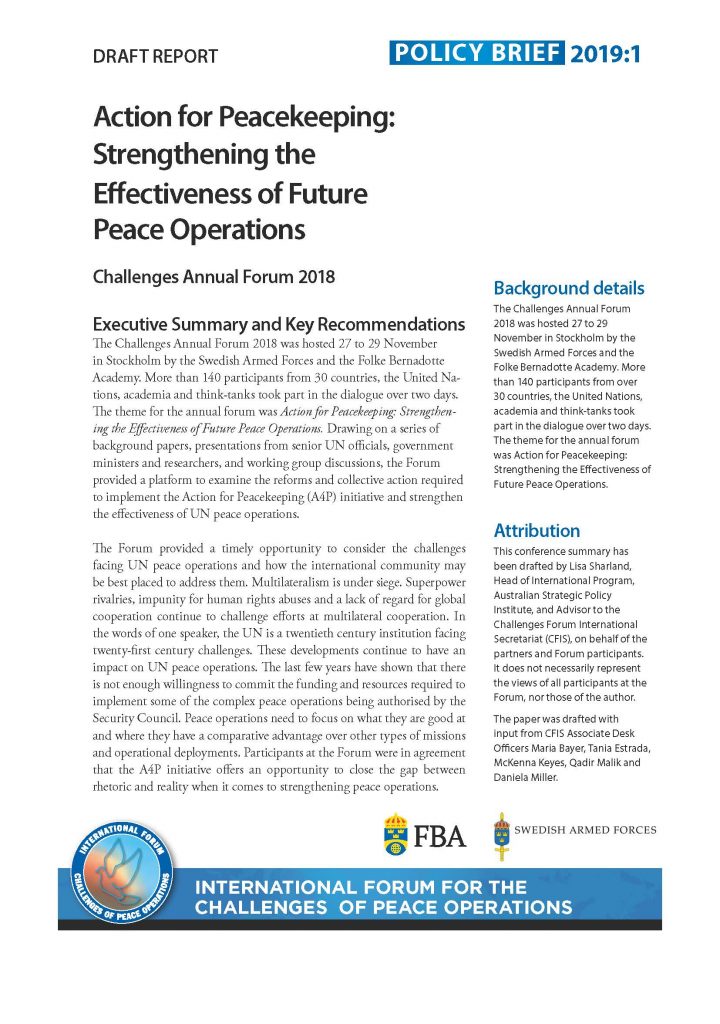2018 Recommendations

The Challenges Annual Forum 2018 was organized 28-29 November in Stockholm, by our Partners Folke Bernadotte Academy and the Swedish Armed Forces, in support of the UN Secretary-General’s initiative Action for Peacekeeping (A4P).
These recommendations are part of the conference summary and they are grouped according to eight ‘Areas of Action’ identified by the Secretariat to take forward A4P.
To read the full Annual Forum Report 2018, click here.
- Support the use of peacekeeping assessed funds to enable more programmatic activities in peace operations.
Stakeholder action: Member States, Secretariat
- Undertake an assessment of missions that have recently transitioned and exited to inform efforts by peace
operations to sustain peace, with a focus on how they have addressed root and intermediate causes of peace and conflict.
Stakeholder action: Secretariat, Think tanks/researchers
- Undertake a media sector analysis in the field to inform the development of strategic communications in mission.
Stakeholder action: Secretariat, Field missions
- Ensure that mission personnel including leadership are accountable for including gender disaggregated data and integrating gender perspectives to inform peace and conflict analysis, planning processes, and reporting on peace operations.
Stakeholder action: Member States, Secretariat, Field Missions
- Undertake comprehensive analysis on uniformed women’s participation at different stages of peace operations to gain further information on the barriers to their participation and identify mechanisms to encourage T/PCCs to increase women deploying to the field, including various incentives.
Stakeholder action: Member States, Think tanks/researchers
- Support the ongoing inclusion of gender adviser posts within missions and at an appropriate level of seniority throughout mandating and budgetary processes, with mission leadership held accountable for their effective utilisation of these posts in the field.
Stakeholder action: Member States, Security Council, Field missions
- Assess the type of information and analysis needed from the ground to inform the work of pen-holders and Council members when mandating missions.
Stakeholder action: Think tanks/researchers
- As part of mandate development, the Security Council should engage more substantively with entities such as the Peacebuilding Commission, regional stakeholders and/or ‘Groups of Friends’, and consider revised working methods or processes to draft more focused mandates.
Stakeholder action: Security Council
- Mission leadership should oversee the development of a mission-wide communications strategy that identifies, among other things, key actors and audiences, and this should be an indicator in senior mission leadership compacts.
Stakeholder action: Secretariat, Field missions
- Analysis should be focused on ‘Peace and Conflict Analysis’ as part of planning or mandate development, and include a focus on the drivers of peace as well as conflict, in order to provide actionable recommendations to inform the political strategy of the mission and its contribution to peace and security.
Stakeholder action: Secretariat, Field missions, Think tanks/researchers
- Examine options to strengthen some of the functions in the Office for Strategic Peacekeeping Partnerships, including through more political and financial support.
Stakeholder action: Member states, Secretariat
- Ensure that vacancy announcements for leadership posts are clear on the required qualities and transparent.
Stakeholder action: Secretariat
- Apply an atrocity prevention lens as part of a peace and conflict analysis to assess the risks to civilians.
Stakeholder action: Secretariat, Field missions
- Increase understanding of the application of International Human Rights and International Humanitarian Law among UN military leadership and missions through pre-deployment and inmission training (including crisis management exercises), with a focus on increasing understanding of the interrelationship between legal considerations, tactical behaviour and political consequences for field missions and T/PCCs.
Stakeholder action: Secretariat, Field missions
- Undertake a comprehensive analysis mapping the relative comparative advantages of UN peace operations, and regionally-led peace operations and enforcement missions, in order to clarify mandate strengthens and strategic political objectives.
Stakeholder action: Secretariat, Think tanks/Researchers
- Designate functions and/or focal points within the UN, African Union and European Union (as well as other regional and subregional organisations) to serve as a partnerships coordinators.
Stakeholder action: Secretariat, Field missions
- Provide further support through deployment of experts and funding to ensure missions are complying with the Human Rights Due Diligence Policy (HRDDP) when cooperating with national, regional and other parallel or partner forces.
Stakeholder action: Secretariat, Field missions, Member states
- Develop a database of different complex and challenging scenarios that peacekeepers have been confronted with in the field for use in training exercises.
Stakeholder action: Secretariat
- Utilise the U7 training branch more effectively to conduct in-mission training for military components.
Stakeholder action: Field missions
- Clearly communicate information on the priority of different training gaps and needs so that Member States can concentrate their support.
Stakeholder action: Secretariat, Field Missions, Member States
- Identify and share examples and case studies of instances where peacekeepers have performed exceptionally in the field, for use as part of training exercises.
Stakeholder action: Secretariat
- Develop policies and identify programs to support post deployment care for serving peacekeepers.
Stakeholder action: Secretariat, Member states
- Ensure rigorous application of the UN Human Rights Screening Policy in order to ensure Member States do not deploy known offenders.
Stakeholder action: Secretariat, Member states
- Ensure that the needs of victims of sexual exploitation and abuse by UN personnel are more effectively prioritised, including through efforts to identify mechanisms to increase accountability and establishing mechanisms for more transparent reporting and engagement with civil society.
Stakeholder action: Secretariat, Member states

